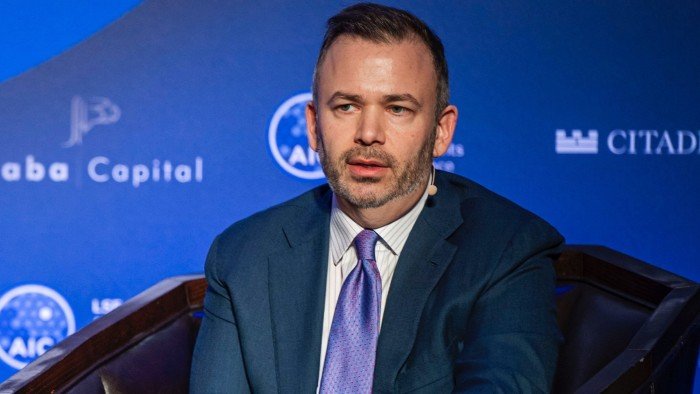Early February, and in the ballroom of the Sheraton Grand hotel in Mayfair, London, Boaz Weinstein is adamant his assault on the UK’s £274bn investment trust industry is only just getting started.
The US-based hedge fund activist had initially hoped to overhaul the boards of seven investment trusts, in order to install his own candidates and ultimately run the trusts’ assets. By the time he had taken to the stage at the LSE Alternative Investments Conference, however, the 51-year-old founder of Saba Capital Management had already lost six of the seven trust votes by an enormous margin. By the end of the week, he would lose the seventh.
Under the spotlight, Weinstein was defiant. “We are going to push funds to wind up or [become] open end,” he told the audience. “We are going to do that over and over again . . . I am not selling.”
He launched into a diatribe against the industry, saying that some of the voters were “employees” and “friends” of the investment trust managers.
Despite his initial salvo proving unsuccessful, Weinstein’s campaign is a wake-up call for Britain’s sleepy, 150-year-old investment trust industry, signalling that it faces prolonged disruption and, some critics argue, a possible existential crisis.
At the heart of Weinstein’s argument is that for too long investment trusts have traded at wide discounts, where a trust’s share price lags behind the value of its assets.
Alan Brierley, an analyst at Investec, says that although Saba’s attack was “egregious and opportunistic”, it showed that the industry needed some “self-reflection”.
Analysts and advisers agree that discounts have been problematic for investors. They warn that Saba’s latest attack means more investment trusts are now at risk of being snapped up by activists, merged away, or converted into open-ended funds, which could radically shrink the industry.
The question is: can the industry react in a way that appeals to today’s investors?
Investment trusts are public companies whose shares are listed on an exchange. They have independent boards to oversee governance and assets are run by fund managers.
A key advantage of investment trusts is the so-called permanent capital. Money is initially raised and used to buy assets, which means when investors buy and sell shares in the trust, the manager does not have to buy or sell assets to meet this demand. This makes the investment trust structure ideal for more arcane and harder-to-trade assets, such as infrastructure and private capital.
But this structure also makes it possible for selling pressure to create wide discounts between the value of underlying assets and trust share prices, since there is no easy way to redeem shares for the full value of the investment held by the fund.
Trusts have had a challenging few years. While the average discount has tightened to 13.8 per cent from a 15-year high of 19 per cent in October 2023, it remains elevated.
The industry has also grappled with a number of pressures, including higher interest rates compared with the near-zero environment in the years that followed the 2008 financial crisis until the end of 2021. Higher interest rates make it more expensive for trusts that have borrowed money to service their debt.
The merging of wealth managers, such as the deal between Rathbones and Investec Wealth & Investment in 2023, has also led to fewer companies with a bigger amount of money to run, making it harder to invest in small trusts.
The sector’s woes also reflect the broader struggles of the UK’s fund management industry, as customers continue to withdraw money in favour of overseas listed equities. In January alone, investors pulled £1bn from UK equity open-end funds, according to fund network Calastone.
“There is a wholesale rout of actively managed funds underway, as investors plump for index trackers, or perhaps paying down their mortgage or holding cash now interest rates have risen,” says Laith Khalaf, head of investment analysis at investment site AJ Bell.
But critics argue that even if there have been broader issues impacting the sector, some managers have failed to address the growing discounts by taking measures such as buying back shares or allowing investors to redeem their shares for the value of the underlying assets.
“Pockets of the industry have been incredibly complacent,” says Brierley. “But this is now a very dangerous stance, and the consequences of inaction should be crystal clear.”
“It’s not necessarily that investment trusts are broken, it’s that people operating [them] haven’t done well enough,” says one person close to Saba’s campaign.
Two of the trusts targeted by Saba have moved to address investor concerns, with Henderson Opportunities allowing investors to roll into an open-ended fund or redeem their shares. The Keystone Positive Change trust is resuming plans made before the Saba campaign began to wind up the company.
Investment trusts trace their roots back to 1868, the same year as the last public execution in Britain. The aim of the first trust, Foreign & Colonial, was to “to provide the investor of moderate means the same advantage as the large capitalist in diminishing risk . . . by spreading the investment over a number of stocks”, according to the AIC.
The Scottish Mortgage Investment Trust, one of the largest, most renowned in the industry and run by Baillie Gifford, was founded in 1909 as a way to offer mortgages to rubber plantation owners in Malaysia, at a time when the rubber industry was booming on the back of the advent of the Model T Ford car in the US.
Today, the trust provides retail investors with access to highly lucrative investments in firms such as SpaceX, which would normally be the exclusive preserve of big investors like sovereign wealth funds and pensions.
Investment trusts have evolved over the years to invest in a wide range of assets, from real estate to US technology stocks, and are managed by well-known names in the asset management industry, from BlackRock to Janus Henderson.
Given the unique features of investment trusts, the industry is unlikely to disappear. But the question now swirling around the City is how can investment trusts evolve to serve shareholders better in the wake of Saba’s attack?
“Investment trusts have gone through turbulent periods before but have always managed to reinvent themselves for a new era,” said Richard Stone, chief executive of the Association of Investment Companies.
Investors will hope that one of the lasting effects will be less extreme discounts. Boards of trusts have recently taken action to tackle this issue, making record levels of share buybacks last year, which involves snapping up the cheap shares to lift their value. Amid pressure from activist hedge fund Elliott, Scottish Mortgage bought back shares to support its own stock last year.
“I think we are moving into a new world, and I would expect boards to take action, which should see discounts narrow and also dampen down discount volatility,” says Brierley.
Another positive has been the record turnout of individuals voting at shareholder meetings requisitioned by Saba — a sign that the industry could expect better engagement between boards and investors in future.
The voting turnouts “shows the power of retail investors,” says Emma Wall, head of platform investments at Hargreaves Lansdown. “Engagement and exercising voting rights gives retail investors a loud voice, to exercise as they wish,” she adds.
Michael Pollitt, 68, a long-term investor in two of the trusts targeted by Saba, told the FT he voted against the activist in part because he would have been left with a huge capital gains charge if he had been forced to liquidate his investment.
“My objection was that a large shareholder was attempting to dictate to all shareholders. It seemed grossly unreasonable and the only options Saba advanced were self-seeking and smacked of a ‘smash and grab’ raid.”
Investors continue to believe that investment trusts serve a purpose, even though the threat of activist takeovers has not gone away. “I’m not opposed to mergers and takeovers of investment trusts, where all shareholders are treated equally,” Pollitt says.






